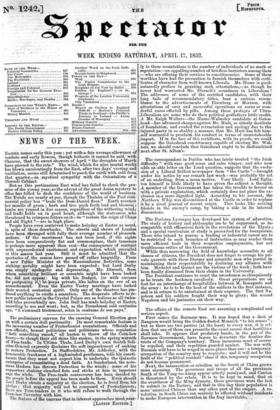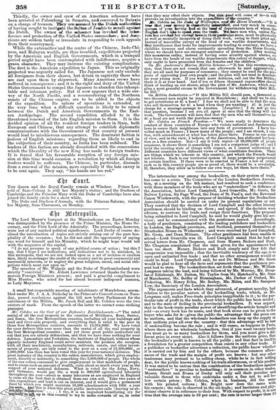First comes the Burmese war. It was hoped that a
dash at Rangoon would bring the Golden-footed Monarch "to his senses " ; but as there are two parties (at the least) to every war, it is sel- dom that one of them can prescribe the exact course that hostilities shall take. It appears that predatory bands, in the pay of the Burmese Government, have begun to devastate the frontier dis- triets of the Company's territory. These incursions must of course be repelled, and their repetition guarded against. The war with Burmah will have to be waged in more places than one : a temporary occupation of the country may be requisite; and it will not be the fault of the " political resident" class if this temporary occupation do not become permanent.
Next, the insurrection or rebellion in the South of China grows More alarming.' The governors and troops of all the provinces South of the Yang-tse-kiang appear utterly paralyzed, and Canton is threatened by the rebels. It is to be kept in mind, that at the overthrow of the Ming dynasty, those provinces were the last to submit to the Tartars, and that to this day their population is more-unmixed Chinese than any other part of the empire. A re- Volution in South China can scarcely be effected without incidents to make European intervention in the fray inevitable. Thirdly, the owner and crew of an American schooner have been arrested at Palembang in Sumatra, and conveyed to Batasia on a charge of treason` limey are saasaed blab. Mital authosiliias of having sought to instigate the &Asa of Jaimbie to revolt against the Dutch. The owner sip the schooner him invoked the inilts- ference and protection of the Unite& States commodere ; and Ame- ricans are seldom tardy or irresolute in responding to such appeals from their countrymen. While the extremities-and the centre of the Chinese, Indo-Chi- nese, and Malayan worlds, are thus troubled, expeditions projected by the American and English Governments, which in a tranquil period might have been contemplated with indifference, acquire a grave Ammeter. They may increase the existing complications. The first is the American expedition to Japan. This as originally projected was urgently called for. The Japanese not only exclude all foreigners from their shores, but detain in captivity those who are cast upon them by shipwreck. Many American crews have suffered in consequence ; and it is the right and duty of the United States Government to compel the Japanese to abandon this inhospi- table and inhuman policy. But it now appears that a wide sur- vey of the North Pacific, and a reconnoitering of the Northern eoasts of the Chinese empire, are to be added to the objects of the expedition. Its sphere of operations is extended, at the very time when a difficult question is likely to be raised between the Dutch and American Governments in the East- ern Archipelago. The second expedition alluded to is the threatened renewal of the late English mission to Siam. It is the decided opinion of all the resident foreign traders in Siam, both European and Chinese, that any attempt to establish diplomatic communications with the Government of that country at present would lead to mischievous consequences. The dominant faction is jealous of English missions; regarding them as likely to end in the subjection of their country, as India has been subdued. The leaders of this faction are already dissatisfied with the concessions which the liberality of the new King has made to foreign traders. It is feared that his favourable reception of any foreign mis- sion at this time would occasion a revolution by which all foreign traders would be sufferers. The Chinese, in particular, dissuade from a renewal of the mission, more especially if the late envoy is to be sent again. They say, " his hands are too red."



























 Previous page
Previous page